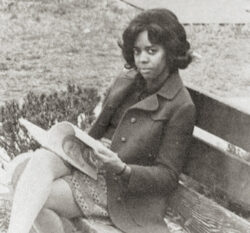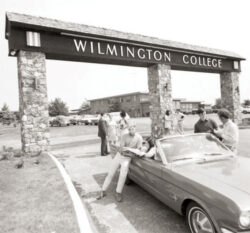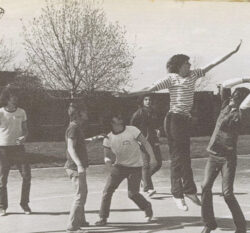Preserving Our Legacy
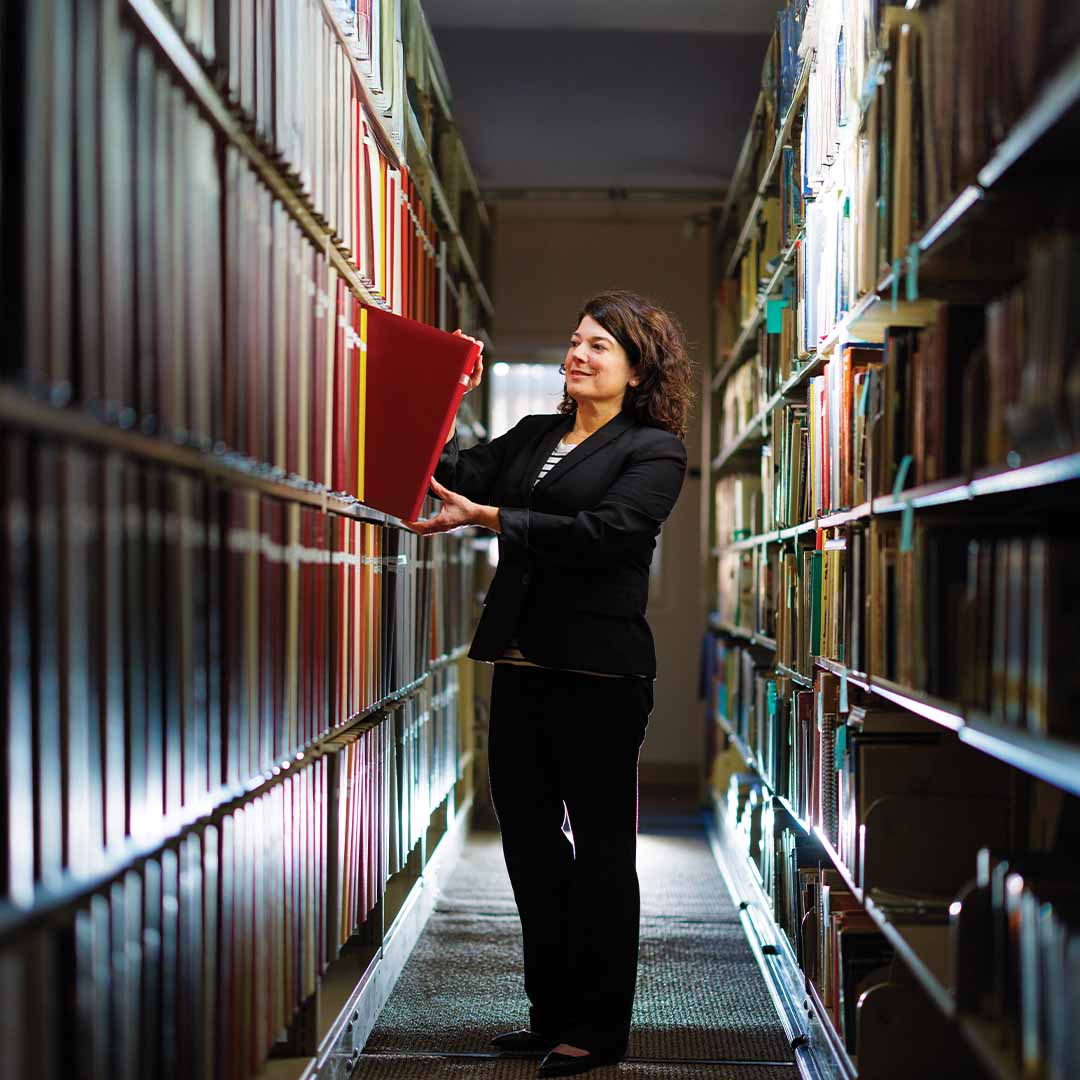
Wilmington University advances its collection and preservation of materials with a new Archives and Special Collections Division.
In 1968, nearly 200 students enrolled at Wilmington College, a four-year institution housed in a former New Castle motel. It was an unconventional site for an innovative college. Founder Dr. Donald Ross wanted to increase access to higher education and career-minded programs regardless of socioeconomic status.
The story of the college’s transformation into a highly respected university is laced with strong, determined visionaries unafraid to take chances. Adrienne Johnson is committed to ensuring that story is accurate, detailed, and available in a centralized repository.
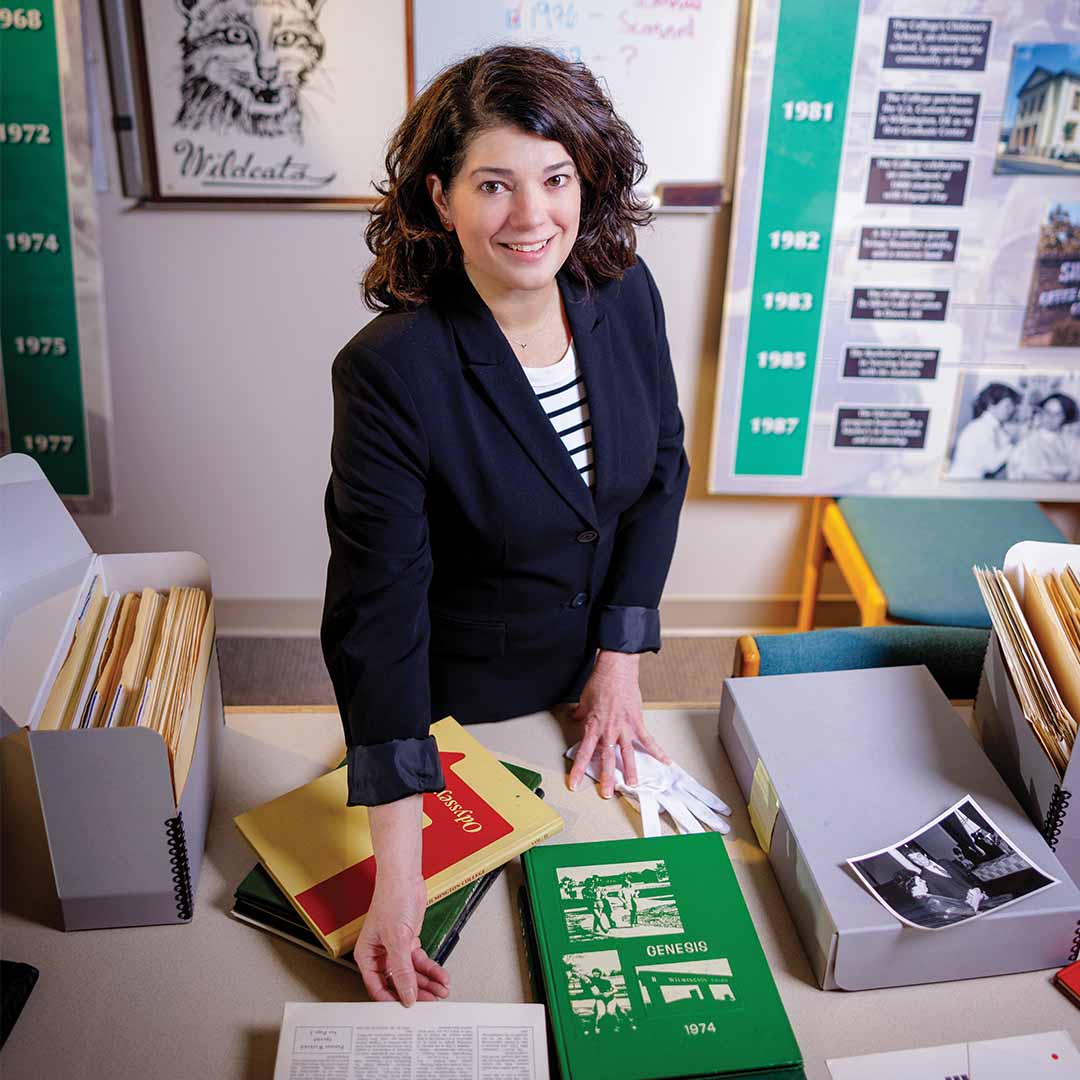
Adrienne Johnson
“We’re unique,” says University Archivist Johnson, who leads the division that debuted in February 2025 and operates within the President’s Office.
“People 50 years from now might want to look back and see how the decision was made to become a university. All the documentation that details the transition and the decision should be stored and protected. We grew exponentially in the early 2000s. I’m intrigued by figuring out what happened, documenting it, and sharing it.”
Admittedly, when people hear the word archive, they picture a dusty basement filled with yellowing books and papers. Or they imagine a treasure-packed chamber from an Indiana Jones movie, Johnson says.
However, WilmU’s archival collections include photographs, textiles, documents, three-dimensional objects, and digital assets. Oral histories, written accounts, event programs, and advertisements provide a better picture of the University’s evolu-tion: The classes and programs that were popular and why or when they were discontinued.
The information is also a portal to an era. For instance, Johnson says that the University’s response to the pandemic will be valuable to future scholars and historians. The archives are also helpful to those interested in Delaware’s history and the growth of the state’s higher education industry.
Former Library Director James McCloskey had long prioritized creating a specialized archives program and, in 2017, formed a committee to pursue a department and dedicated archivist. The initiative gained momentum after the pandemic.
There is a sense of urgency. Given that the University was founded in 1968, there are faculty and charter students who can provide critical information, says Johnson. “But if we wait too long, those stories disappear. We want to make sure the history is preserved in perpetuity.”
The University archives already have a solid foundation with some 6,000 inventoried items. Credit essentially goes to former Chief Librarian Mary Lou Ponsell, who diligently assembled items and documents from Wilmington College’s early days.
Ponsell was the librarian in 1973 when the college received 35,000 books from Cardinal Cushing College. This purchase allowed Wilmington to meet the accreditation standards of the Middle States Association of Colleges and Secondary Schools.
Ponsell spent 25 years at WilmU, collecting meeting minutes and program and course information. After her retirement, library staff took over the role, but it was part of their overall duties. Johnson had been assistant library director and archivist.
Without oversight, unknowing employees purged their offices without wondering if programs, ads, or course guides were worth saving. Emails and digital documents were easily deleted.
“There’s a huge gap in our recorded history,” says Johnson. “Can what’s stored here be used for research in another 50 years? We need to recapture periods from the late ’90s to when we didn’t have an archivist.”
WilmU’s archival collections include photographs, textiles, documents, three-dimensional objects, and digital assets.
A New Leader
Johnson was a natural choice. She has a master’s in Library and Information Science from Drexel University and has been at the library since 2006. She previously worked for the Chester County History Center as a project photo archivist.
“It’s what I always wanted to do,” she says of her dream job. “I got my master’s in Library Science to go into archive work.”
Moreover, the Delaware native was also a Wilmington University student. Initially, she studied History and Art History at the University of Delaware while working full-time. She had to reconsider her options since she had only three courses left to earn her degree, but all the required classes met during the day.
“I just couldn’t do it,” she says. “A friend referred me to Wilmington University.” She worked full-time for the next 18 months while earning a bachelor’s in Liberal Studies with a concentration in History.
“We’re fortunate to have a dedicated and knowledgeable professional like Adrienne to serve as our archivist,” says Wilmington University President Dr. LaVerne Harmon. “She is collecting and preserving materials that document the University’s history while promoting its use for research, institutional development, and community engagement. The fact that Adrienne is also an alumna is equally important.
She’s passionate about her work and understands our culture. She’s also widely respected, so she can work collaboratively with faculty, staff, alumni, and community stakeholders to doc-ument an accurate history of the University.”
Johnson is developing a strategic plan to establish the initial goals and objectives for the division, ensuring alignment with the University’s mission, vision, and institutional priorities. She will also develop policies and procedures for archives access, collection management, disaster preparedness, digitization, donations, and records manage-ment. She aspires to integrate archival initiatives into broader institutional goals and engagement efforts.
As the University’s first full-time archivist, Johnson is identifying relevant items that might benefit future scholars and decision-makers. The process involves a record-management policy to determine which University records should be destroyed or archived for preservation. Awareness campaigns will help prevent soon-to-retire staff and faculty from doing a clean sweep of their offices.
Alumni are also valuable resources. “We have received some neat items, including a blazer that men used to wear back in the ’70s when they were on campus, as well as an original student ID,” says Johnson.
Donated yearbooks are prized; a few are missing from the early years. These objects are historical and engaging. For example, yearbooks were on view at the 2018 Green & White Scholarship Ball honoring the University’s 50th anniversary. Archival photos published on social media by WilmU’s University Relations team resulted in scores of “likes” and comments.
When the first graduating classes celebrated the 50th anniversary, alumni could reminisce over student newspapers, yearbooks, photographs, and programs. The outreach is having a positive effect. In 2024, views of the archives’ institutional repository soared 900% from the school year 2022-2023.
In addition to collecting and preserving exhibits related to the school’s history, the department will manage special collections. Dr. Arthur Gilbert, previously coordinator of the Adjunct Graduate Program at WilmU’s downstate campus, donated his comprehensive collection of automobile-related ads, books, magazines, diecast models and riding clothes.
Dr. Gilbert fell in love with automobile advertising as a teenager when he saw an ad for the Nash Ambassador car in the January 1954 Time magazine, according to a 2017 article in this magazine. He amassed 30 pieces of promotional glassware, more than 230 models, and 320 binders of original advertisements.
His collection includes 41 editions of “Dr. Art’s Auto Ramblings” newsletters, which Gilbert wrote for the Historical Vintage Car Club of Delaware. Many are hundreds of pages, and Johnson and her team have digitized the newsletters. They hope to catalog the entire collection so outside researchers interested in automobile history can access them.
Johnson plans to collaborate with University academic colleges on projects to grow the division. Having a temperature-controlled, dedicated space is a long-term goal. “We want proper security, humidity controls, and space to grow the collections,” she says.
In the meantime, keeping archival and special collections in a centralized, professionally managed location is essential. A record-keeping system that controls and tracks the items is necessary.
Moreover, the collection must be accessible via public-facing interfaces, online exhibits, and digital content to inform and interest stakeholders and add value to the University and the community. Over the past several years, approximately 50 gigabytes of archival content has been digitized, including newsletters, yearbooks, and photographs.
Johnson does not limit her passion for archiving to the University. She says she is the “keeper of everything” related to her family. “I have all the photographs and ancestry.com accounts, and I do the family history.”
The self-professed packrat feels privileged to pursue her passion at WilmU. “It’s just so wonderful,” she says of her new role. “It’s always fun to find a little nugget of history that demonstrates the unique culture of Wilmington University. It makes me so proud to work here. Since 1968, the culture and mission have been the same.”
While the site is expected to grow significantly, Wilmington University digitized objects can be viewed on Wilmington University’s Delaware Collections page.
— Pam George
Want to read more in-depth stories? Explore our latest magazine articles.
